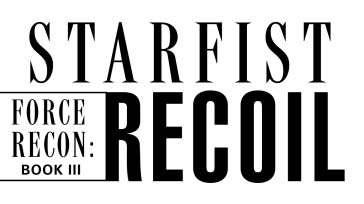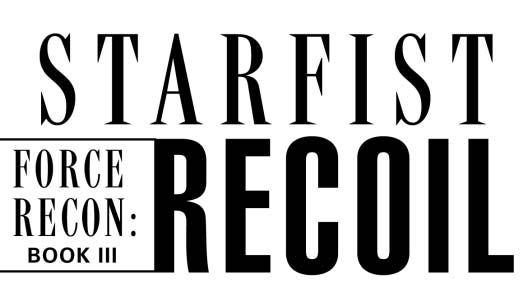Starfist FR - 03 - Recoil
Read Starfist FR - 03 - Recoil Online
Authors: Dan Cragg


This book has been optimized for viewing
at a monitor setting of 1024 x 768 pixels.

SCHOOL OF FIRE
BLOOD CONTACT
TECHNOKILL
KINGDOM’S SWORDS
KINGDOM’S FURY
A WORLD OF HURT
FIRESTORM
Starfist: Force Recon
POINTBLANK
STAR WARS: JEDI TRIAL
By David Sherman
The Night Fighters
MAIN FORCE ASSAULT
A ROCK AND A HARD PLACE
CHARLIE DON’T LIVE HERE ANYMORE
THERE I WAS: THE WAR OF CORPORAL HENRY J. MORRIS, USMC
Demontech
GULF RUN
RALLY POINT
By Dan Cragg
Fiction
THE SOLDIER’S PRIZE
Nonfiction
GENERALS IN MUDDY BOOTS
INSIDE THE VC AND THE NVA (with Michael Lee Lanning) TOP SERGEANT (with William G. Bainbridge)


BALLANTINE BOOKS • NEW YORK
Published in the United States by Del Rey Books, an imprint of The Random House Publishing Group, a division of Random House, Inc., New York.
Del Rey is a registered trademark and the Del Rey colophon is a trademark of Random House, Inc. eISBN: 978-0-345-50953-6
v1.0
Montgomery Homestead, Haulover Chad Montgomery stepped onto the porch of his house just as the sun rose over the eastern horizon. His face contorted and his jaw twisted side to side in a great yawn; his back arched and he flung his arms out to the sides to force more air into his lungs. The last dregs of sleep gone, breathing easily, he turned to face the red orb and watched its wavering disk, only its upper half yet visible. In moments the sun rose completely above the horizon, and the disk wavered less, became brighter, too bright to continue looking at. He rested his eyes on the green and red fields that spread halfway to the horizon to his east and south, to where they butted up against the native trees, and smiled. The grapelopes, beetpeas, and spinmaize were native to Haulover, but their proteins and amino acids were fully digestible by the human system and provided nutrition as good as any of the vegetables imported from older worlds in Human Space; imported seeds were so expensive to grow locally that the native foodstuffs quickly became standard fare. And they were mighty good tasting. Those fields were the Montgomerys’ third crop, and Chad was certain the harvest would bring in enough to allow him to pay off the loan he’d taken out to start the farm. He smiled again, hearing the homey sounds and tinkling voices of his wife, Connie, and elder daughter, Margery, as they fixed a hearty farm breakfast. A moment later the light voice of his younger son, Mitchell, joined with the voices of the women, and it was obvious from the “shoo”s and “careful there”s that the youngster was trying to help but was getting in the way more than helping.
Chad sucked in another deep breath then blew it out. He turned his head at a footfall next to him and smiled at his firstborn, Clement.
“Claire’s still abed?” Chad asked.
“Sure is,” Clement said with a shake of his head. “That girl’ll never make a proper farmwife.”
Chad chuckled. “We’ll fix that. Your mother has another one in the oven. We’ll give its care to Claire. Then she won’t be able to be a slug-a-bed.”
“Gonna be a ‘C’ name?”
“Of course. Clif for a boy, Corine for a girl.”
Clement eyed his father. “You don’t know yet?”
Chad shook his head. “We decided we’d like to be surprised this time.”
“So how long do I have to wait before I know whether my youngest sibling is a brother or a sister? Mama’s not showing yet.”
“Seven months.”
Clement looked out over the fields and nodded. “Smart timing, there. The crop’ll be in, and Mama will have time to recover before the next sowing.”
“Right. We might want to be surprised by the new one’s sex, but that didn’t mean we wanted an accident.”
Clement nodded again. He remembered his father telling him the deciding reason for the family’s emigrating was that their home world had adopted strict population-control measures, capping family sizes at three children. But Chad and Connie wanted a large family. Connie had been pregnant with Mitchell when they left to make a new home here. The first three had come at three-year intervals, but Mitchell was five years behind Claire. Thanks to the demands of settling in a new world and starting the farm, child five, whether Clif or Corine, would be four years behind Mitchell.
From inside, they heard Connie tell Mitchell to run upstairs and drag his sister out of bed before she missed breakfast. Mitchell laughed delightedly at the prospect and tromped away to do his mother’s bidding.
“Life is good,” Chad murmured.
“It is,” Clement agreed.
“Let’s—”
Whatever Chad was going to say was cut off by Mitchell’s scream.
Strictly speaking, Spilk Mullilee had no business being there. The constabulary was treating it as a crime scene, and the police believed that the planetary administrator would only get in the way. Haulover’s attorney general was also concerned that, if there was a political aspect to the alleged crime, the presence of the planetary administrator might jeopardize the findings of the crime scene investigation. And Haulover’s minister of war chimed in with a protest that if the incidents were the work of an unknown enemy force, the planetary administrator could be putting himself in unnecessary danger. Spilk Mullilee ignored them all. It was the thirteenth such incident in less than four months and, as planetary administrator, he believed it was his duty to see the site for himself. He couldn’t continue to wait idly for Robier Altman, a Confederation of Human Worlds under minister of state who also happened to be an old friend, to reply to the message he’d sent almost a month ago. So even though, strictly speaking, Spilk Mullilee had no business being there, he had to be present at the investigation. After all, the planetary administrator was responsible to the Confederation for everything that happened on his world. Looking to the east and south, Mullilee saw fields of native vegetables, stretching halfway to the horizon, rich fields that would provide nourishment for thousands once they were harvested. If they were harvested. Looking north and west, where the farmhouse and outbuildings with the machinery needed to work the farm should have been, all Mullilee saw was devastation. He’d already looked at images of the farm when the buildings had been there. Now the view was biblical—not one stone left standing on another. Literally.
Everything burnable had been turned to ash. The bricks and stone pulverized to sand and dust. Even the plasteel and the metals in the farm equipment had melted to slag. Despite the concerns of the constabulary, Mullilee was careful to keep out of the way of the technicians who sifted through the wreckage. Mullilee flashed on a trid he’d once seen of twenty-first-century archaeologists excavating a Neolithic site, how they’d sifted dirt through a large sieve, winnowing out small bits that might be something other than dirt. Some of the techs on the site of the Montgomery homestead looked just like what he’d seen in that trid. Others, bearing objects that pinged or bonged or flashed colored lights, stepped carefully about the site, keeping off ground that hadn’t yet been sifted. Whatever they were doing was, to Mullilee, indistinguishable from magic; he knew neither the tools they manipulated nor what they did. What did Mullilee expect to see here, anything that the techs couldn’t find more easily and quickly than he could? Nothing, which was why he kept off ground they hadn’t covered, and otherwise stayed out of their way, carefully not doing anything to interfere.
He hoped the techs would find something that would tell them—and him—more than they’d gotten from the first three homesteads, and from the more recent ones that had been destroyed the way this one was. Something like what happened to the people. Eight people were missing here: the Montgomerys, their four children, and two hired hands. That brought the total missing in the thirteen incidents to sixty-seven people, people who seemed to have simply vanished, except for a few tiny bits of white stuff that may or may not have been human bone. A new world such as Haulover expected to lose people in the
beginning. But not to have them simply vanish. With their homesteads so thoroughly destroyed. Office of the Planetary Administrator, Haulover We need help, I need help, Mullilee wrote in another message to Robier Altman. The Haulover Constabulary and the Ministry of War have concluded that the homestead destructions and missing people are the work of enemy military operations. But they have no idea who, or why. Do you have contacts who can get us help, or can you direct me to the appropriate office in the Heptagon?
I’m desperate.
ONE
Home of Jimmy Jasper, Tabernacle, Kingdom It was sunup on the sixth day of the seventh month when Jimmy Jasper and his wife, Zamada, sat down to a meager breakfast as they did every morning at that same time. As one of the Men of the Spirit, Jimmy had no time to dawdle over his meal that morning. He had a full schedule to meet that day: visits to the sick, a funeral in the afternoon, two prayer meetings, one with the swing shift going on duty at the mines, and a planning session with other elders for the Holiness Camp scheduled to commence later that month. So, preoccupied with his pastoral duties, he dug in with hardly a word to his wife. The bowls of oatmeal steamed in the cool morning air and the chicory root coffee, sweetened with brown sugar and laced with goat’s milk, filled their tiny kitchen with its rich aroma. Zamada, left to her own, would have preferred real coffee, but it was expensive and Jimmy insisted on chicory root because he believed it helped with digestion. And what Jimmy Jasper wanted in his home was law; Zamada obeyed her husband as any devoted consort would, to the letter of that law. Jimmy had only lifted the first spoonful of oatmeal to his lips when the house shook violently and the air was split by a great explosion.